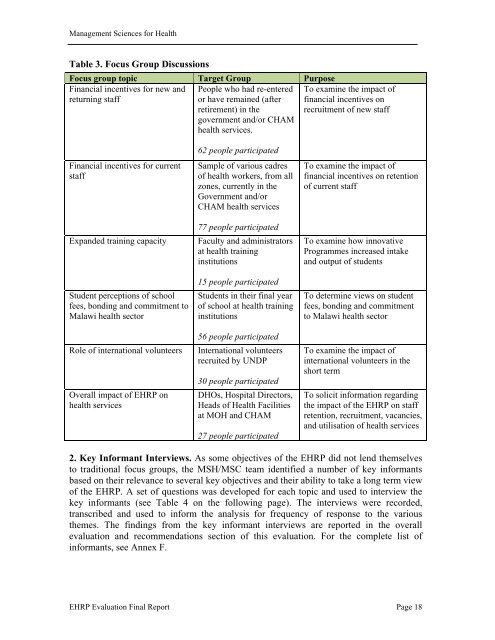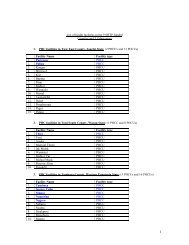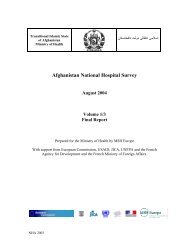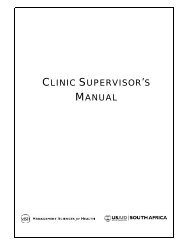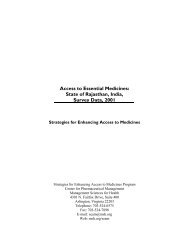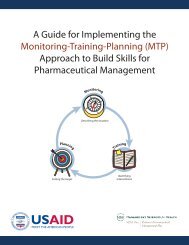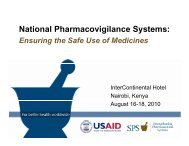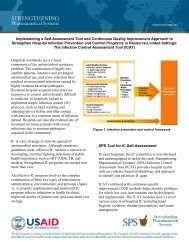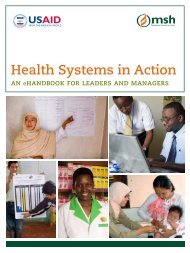Evaluation of Malawi's Emergency Human Resources Programme
Evaluation of Malawi's Emergency Human Resources Programme
Evaluation of Malawi's Emergency Human Resources Programme
You also want an ePaper? Increase the reach of your titles
YUMPU automatically turns print PDFs into web optimized ePapers that Google loves.
Management Sciences for Health<br />
Table 3. Focus Group Discussions<br />
Focus group topic Target Group Purpose<br />
Financial incentives for new and<br />
returning staff<br />
Financial incentives for current<br />
staff<br />
Expanded training capacity<br />
Student perceptions <strong>of</strong> school<br />
fees, bonding and commitment to<br />
Malawi health sector<br />
Role <strong>of</strong> international volunteers<br />
Overall impact <strong>of</strong> EHRP on<br />
health services<br />
People who had re-entered<br />
or have remained (after<br />
retirement) in the<br />
government and/or CHAM<br />
health services.<br />
62 people participated<br />
Sample <strong>of</strong> various cadres<br />
<strong>of</strong> health workers, from all<br />
zones, currently in the<br />
Government and/or<br />
CHAM health services<br />
77 people participated<br />
Faculty and administrators<br />
at health training<br />
institutions<br />
15 people participated<br />
Students in their final year<br />
<strong>of</strong> school at health training<br />
institutions<br />
56 people participated<br />
International volunteers<br />
recruited by UNDP<br />
30 people participated<br />
DHOs, Hospital Directors,<br />
Heads <strong>of</strong> Health Facilities<br />
at MOH and CHAM<br />
27 people participated<br />
To examine the impact <strong>of</strong><br />
financial incentives on<br />
recruitment <strong>of</strong> new staff<br />
To examine the impact <strong>of</strong><br />
financial incentives on retention<br />
<strong>of</strong> current staff<br />
To examine how innovative<br />
<strong>Programme</strong>s increased intake<br />
and output <strong>of</strong> students<br />
To determine views on student<br />
fees, bonding and commitment<br />
to Malawi health sector<br />
To examine the impact <strong>of</strong><br />
international volunteers in the<br />
short term<br />
To solicit information regarding<br />
the impact <strong>of</strong> the EHRP on staff<br />
retention, recruitment, vacancies,<br />
and utilisation <strong>of</strong> health services<br />
2. Key Informant Interviews. As some objectives <strong>of</strong> the EHRP did not lend themselves<br />
to traditional focus groups, the MSH/MSC team identified a number <strong>of</strong> key informants<br />
based on their relevance to several key objectives and their ability to take a long term view<br />
<strong>of</strong> the EHRP. A set <strong>of</strong> questions was developed for each topic and used to interview the<br />
key informants (see Table 4 on the following page). The interviews were recorded,<br />
transcribed and used to inform the analysis for frequency <strong>of</strong> response to the various<br />
themes. The findings from the key informant interviews are reported in the overall<br />
evaluation and recommendations section <strong>of</strong> this evaluation. For the complete list <strong>of</strong><br />
informants, see Annex F.<br />
EHRP <strong>Evaluation</strong> Final Report Page 18


